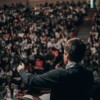Based on the review of Oppenheimer biographies we offered in the last two posts, a set of common themes begins to come to the surface. These themes bring into greater relief how Oppenheimer developed a fragmented understanding of the academic vocation, and what we can do to cultivate a healthier version of it.
First, all of the scholars who covered the adolescent years of Oppenheimer’s life go into great detail concerning the significant influence offered by the Ethical Culture School. Under the leadership of Felix Adler, The Society of Ethical Culture emerged from Manhattan’s Temple Emmanu-El. According to Cassidy, Adler’s “epiphany” came in terms of the establishment of The Society of Ethical Culture while reading the work of Immanuel Kant. Thorpe offers that “Adler argued that the universal moral message of Judaism should be stripped of the trappings of religious doctrine and ritual.”1
In particular, when he realized that religious doctrine escaped empirical proof and that matters of morality were universal to human experience, Adler settled on the motto of “Not by the Creed but by the Deed!”2 As a result, Adler set out to establish a society that could pursue the advancement of humanity without the sense of particularity attached previously to Judaism or any other particular religious tradition. The Ethical Culture School became the means of introducing the young to this commitment. In particular, Thorpe notes that Oppenheimer’s father, Julius Oppenheimer, “was interested in Ethical Culture as a philosophy and a worldview.”3
At the age of eight, Oppenheimer was registered as a student at the Ethical Culture School. He would remain a student at the school until he graduated after the equivalent of his senior year. According to Bird and Sherwin, “the sheltered atmosphere of the Ethical Culture School was ideal for an unusually awkward adolescent polymath [such as Oppenheimer].”4 Thorpe concludes that “Oppenheimer’s interests ranged from science to literature, poetry, and art.”5 The curriculum not only catered to his interests, but his teachers proved to be invaluable as well.
In a broad sense, one of the more influential teachers Oppenheimer encountered while he was a student at The Ethical Culture School was Herbert Winslow Smith. In addition to being Oppenheimer’s homeroom teacher, Smith was also his literature teacher. Smith recognized Oppenheimer’s interest in literature and particularly for poetry. He was also the one who went with Oppenheimer on a trip to New Mexico following Oppenheimer’s final year at The Ethical Culture School. Thorpe portrays the trip as an opportunity for Oppenheimer to escape from the pressures of not only his family’s affluence but also their Jewish heritage.6 We would therefore add that both the metaphysically barren upbringing within the Ethical Culture School and Oppenheimer’s lack of comfort with his Jewish identity had a potentially detrimental impact on his understanding of the academic vocation.
In this regard, the only identity guiding Oppenheimer appeared to be his professional identity. Here he received significant mentorship. One of the more influential teachers Oppenheimer encountered—also while he was a student at The Ethical Culture School—was Augustus Klock. Bird and Sherwin note that Oppenheimer “would always feel indebted to Klock for having set him on the road to science.”7 According to Thorpe, “Klock regarded Oppenheimer as having great potential and gave him private tutoring outside school hours.”8 Oppenheimer would spend time after school and even during breaks working with Klock. Through Klock, Oppenheimer developed an initial appreciation for working both in the lab and in the field.
In addition, Oppenheimer’s early interests in science related more to chemistry than physics—although he studied both under Klock. As a graduate student, Oppenheimer’s understanding of the academic vocation would lead him to physics and specifically to theoretical physics. Although any understanding of science as a means to cultivate an ethical culture envisioned by Adler would escape Oppenheimer as an adolescent, he would begin to embody the ideals of such a movement during his time as an assistant professor holding joint appointments at both UC-Berkeley and Cal Tech when he became a fellow traveler of the communist party.
Second, the scholars who cover the full scope of Oppenheimer’s life also emphasize how his understanding of the academic vocation developed from the time he enrolled as an undergraduate at Harvard through his time as an assistant professor at both UC-Berkeley and Cal Tech. Across the board, all of these scholars contend that Oppenheimer’s years at Harvard as an undergraduate and as a graduate student at Christ College, Cambridge (in particular, the Cavendish Laboratories) were difficult.
The political climate at Harvard, as promoted by the administration of President A. Lawrence Lowell, was one where a quota was established to restrict the number of Jewish students who were allowed to enroll. Such an unfortunate environment did not prove to be the best for a young person who, according to Cassidy, was beginning to come to terms with “his incoherent sense of self.”9
In addition, the nature of the physics department at Harvard at that time was not one that proved to be most conducive to a person whose interests would gravitate eventually toward theoretical physics. Oppenheimer’s knowledge of the field was great enough at the time that he realized the theoretical dimensions of physics were developing rapidly during the 1920s. However, as Pais notes, Oppenheimer realized, also, that “Harvard was not the best place for experiencing those intellectual tensions.”10
Although Oppenheimer’s struggles with his sense of selfhood would continue to plague him through his years at Cambridge, by virtue of elimination, Oppenheimer realized that his understanding of the academic vocation resonated more with theoretical physics than with experimental physics. According to Bird and Sherwin, “clumsy and inept at this meticulous work [the work of experimental physics], Robert soon found himself avoiding the laboratory.”11 However, Cambridge provided Oppenheimer with an opportunity to get even closer to the center of the conversations going on in the realm of theoretical physics.
For example, Oppenheimer had the chance to meet both Niels Bohr and Max Born while he was at Cambridge. The first scholar would prove to be Oppenheimer’s intellectual mentor while the latter scholar was his mentor during his doctoral studies at the University of Göttingen. Several troubling anecdotes, however, point to the fraying nature of his sense of selfhood, which also emanated from this period of his life. For example, several of these full-length biographies recount an unfortunate incident where Oppenheimer allegedly jumped on top of his friend, Francis Fergusson, and wrapped a trunk strap around Fergusson’s neck in an apparent attempt to strangle him. None could provide a clear reason why.
Bird and Sherwin note that when Oppenheimer left Cambridge for Göttingen, he remarked that he was unsure if he was able to face the work of theoretical physics. Regardless, Oppenheimer knew that such work had become his vocation and that he must face it. According to Thorpe, this “search for vocation was a matter both of finding an institutional position and formal career and of finding a disciplining framework that would structure his identity and provide a sense of meaning and direction.”12
Formally, Oppenheimer found this sense of meaning and direction at Göttingen under the guidance of Max Born. Concerning Born, Bird and Sherwin acknowledge that he “was regarded by his students as an unusually warm and patient teacher. He was the ideal mentor for a young student with Robert’s delicate temperament.”13 Over the course of his years at Göttingen, Oppenheimer was able to publish five papers. Pais notes that one of these papers established “the ‘Born-Oppenheimer method,’ a famous paper, still the basis of any treatment of molecules.”14
Overall, we largely find Oppenheimer casting off or neglecting other parts of his identity beyond his professional identity. Instead of putting together a whole self, Oppenheimer reduced himself to his professional identity and its attendant challenges. Perhaps one way to summarize Oppenheimer’s experience at Göttingen is through a quote offered by Oppenheimer himself in a letter he sent to his brother Frank in 1926: “I find the work hard, thank God, & almost pleasant.”15 How he made meaning or purpose out of the rest of his identities and life remains unclear but merits further exploration—exploration to which we will turn in the final post in this series.
Footnotes
- Thorpe, Oppenheimer, 23.
- Cassidy, Oppenheimer and the American Century, 24.
- Thorpe, Oppenheimer, 23.
- Bird and Sherwin, American Prometheus, 23.
- Thorpe, Oppenheimer, 26.
- Thorpe, Oppenheimer, 27.
- Bird and Sherwin, American Prometheus, 23.
- Thorpe, Oppenheimer, 25.
- Cassidy, J. Robert Oppenheimer and the American Century, 62.
- Pais, J. Robert Oppenheimer, 8.
- Bird and Sherwin, American Prometheus, 42.
- Thorpe, Oppenheimer, 39.
- Bird and Sherwin, American Prometheus, 57.
- Pais, J. Robert Oppenheimer, 10.
- Bird and Sherwin, American Prometheus, 56.























